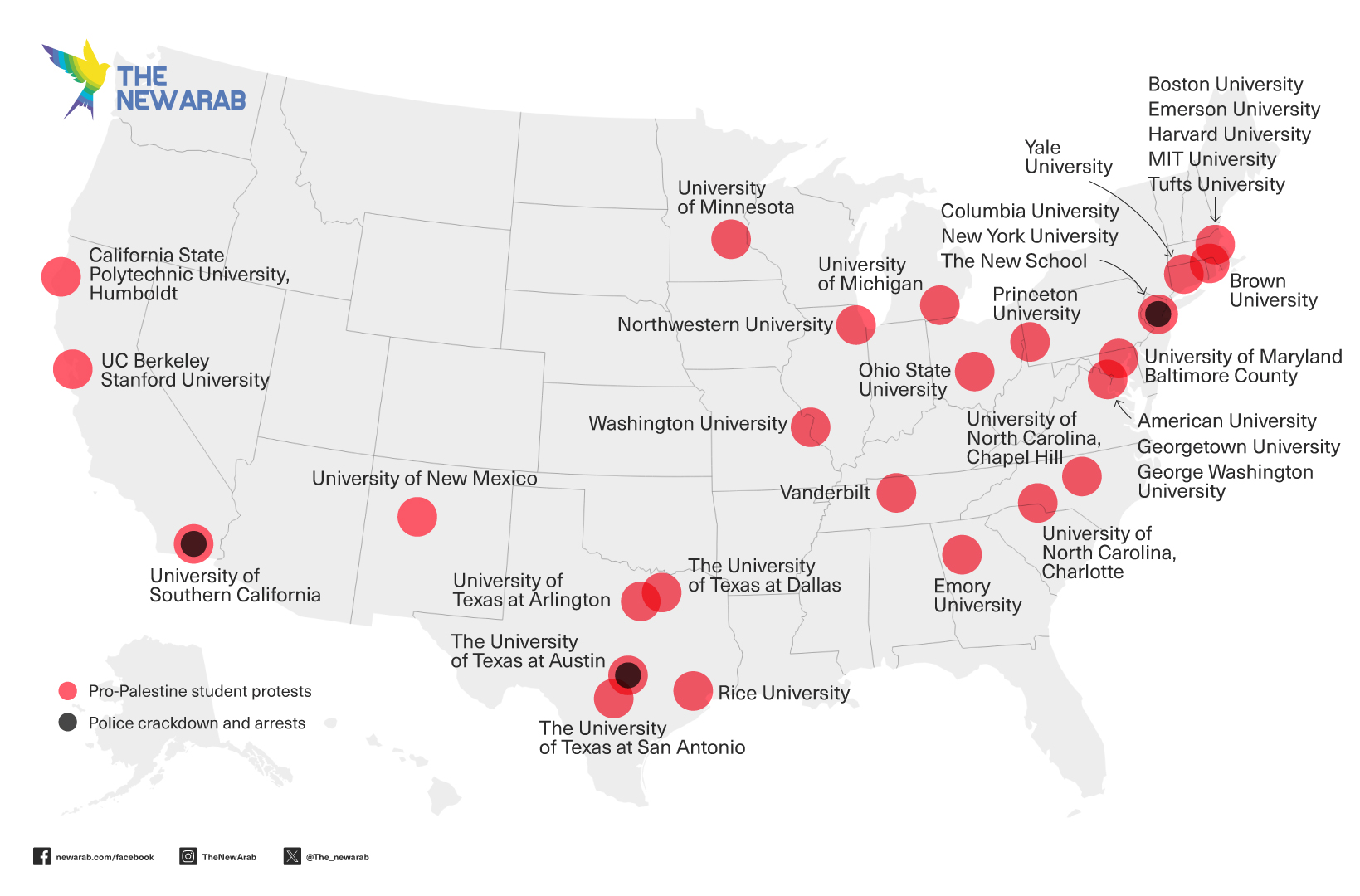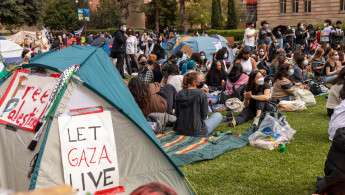Professors arrested as US pro-Palestine student protests face heavy police response
Nationwide pro-Palestine student protests at US colleges faced increasing crackdowns by police throughout Thursday and Friday, resulting in the arrest of hundreds, including professors, as college administrations sought to quash support for Palestinian rights.
At least sixteen universities have seen large-scale demonstrations in support of Palestinians and calling for an end to the war, with the arrests galvanising more students to participate against what is being seen as infringements on freedom of speech.
On Thursday, police forces aggressively shut down protests at Emory University in Georgia, arresting 28 people, including two professors. Videos shared online showed police binding protesters' wrists and firing pepper balls.
This adds to the hundreds of students detained over the past week at notable universities such as the University of Texas at Austin, New York University, Emerson College, Indiana University, Atlanta University, and the University of Southern California.
One of those arrested at Emory University was economics professor Caroline Fohlin. In a video taken by CNN, Fohlin can be seen enquiring about the safety of a student who being arrested before she is then violently thrown to the ground and put in a hold position by a police officer.
Some of those detained at Emory on Thursday have since been released while others were charged with disorderly conduct or criminal trespass, CNN reported.
The current wave of demonstrations were triggered when students at Columbia University in New York staged a Gaza protest encampment on the campus' main lawn last week.
After their requests to disband were unheeded, the university's president Minouche Shafik called in the New York Police Department, which arrested over 100 students on suspicion of criminal trespass.

However, the arrests sparked outrage and triggered a wave of support from students across the US, leading to subsequent encampments being established at the University of Texas at Austin, Brown University, the University of Maryland, and the University of Southern California, among others.
The students are largely demanding that their colleges disclose links or divest from Israeli companies, given Israel’s brutal war on Gaza, which has killed more than 34,000 Palestinians and destroyed swathes of the territory.
Students have said the demonstrations remained peaceful until the arrival of police forces.
Democrat congresswoman Ilhan Omar visited students at Columbia on Thursday and said on social media site X: "Contrary to right-wing attacks, these students are joyfully protesting for peace and an end to the genocide taking place in Gaza."
As of Friday, administrators at Columbia were still in negotiations with student leaders, having passed a deadline set by the college for students to remove the encampment. Students are hoping their demands will be met, which include divesting and a total amnesty on the protests for students and professors.
The president Minouche Shafik has come under scrutiny from across the board for her dealings with the protesters. Shafik was criticised for calling in the police to shut down the protests while right-wingers have accused her of allowing antisemitism to flourish on campus.
On America's West coast, protests continued at the University of Southern California despite Los Angeles Police Department arresting some 100 students on Wednesday who had set up tents on the front lawn.
The university provoked outrage when it announced on Thursday that it would cancel the commencement ceremony for final-year students due to safety concerns.
One professor at the university criticised the provost and president for allowing "the campus to become a dangerous, militarized space".
It is worth watching this CNN video from the moment Emory Econ Professor @CarolineFohlin came across the violent arrest of a protester on campus and asked the police, with shock, "What are you doing?" That's all that prompted an officer to hurl her to the ground and handcuff her. https://t.co/QKNRqOoIiS pic.twitter.com/uYpXwKuc8D
— Robert Mackey (@RobertMackey) April 26, 2024
The Palestine protests have drawn comparisons to the student-led demonstrations on American campuses against the Vietnam War in the 1960s, which turned deadly when the National Guard opened fire at Kent State University, killing four student demonstrators.
The student movements have also inspired similar protests at universities in the UK, France, and Ireland, generally demanding that universities divest from Israeli-linked companies, disclose investments, and support a ceasefire in Gaza.
Many US colleges share degree programs with Israeli universities and maintain close academic ties, with students from both countries participating in exchange semesters.
The demonstrations have become a major flashpoint in US politics, as right-wing politicians have sought to falsely portray the pro-Palestine protests as antisemitic and "anti-Israel."
President Joe Biden is attending events in New York on Friday, which will bring him close to the tense protest scenes on campuses. So far, Biden has dodged commenting explicitly on the demonstrations but has maintained throughout his presidency openness for student activism and freedom of speech.
However, the optics will remain challenging for him as the protests come as the president signed a $95 billion package, which will see Israel handed $17 billion in military aid for its war on Gaza.





 Follow the Middle East's top stories in English at The New Arab on Google News
Follow the Middle East's top stories in English at The New Arab on Google News


